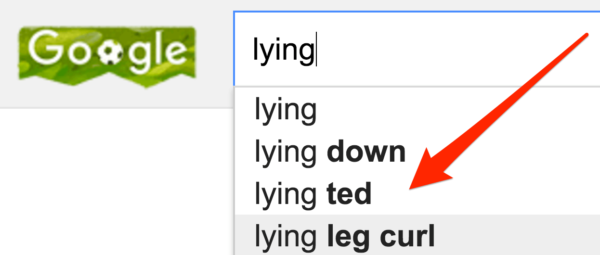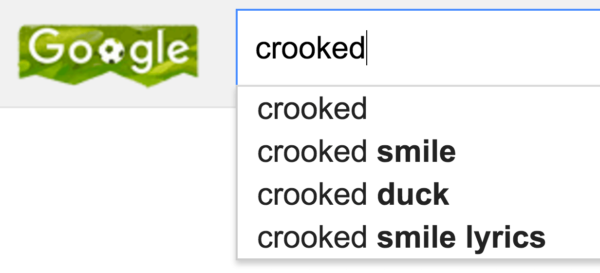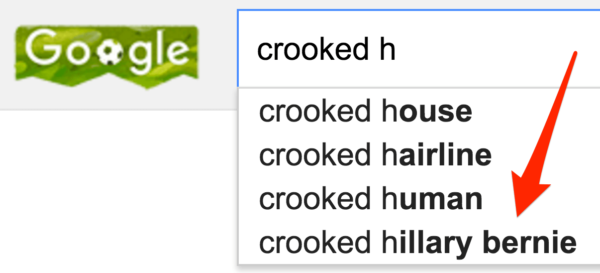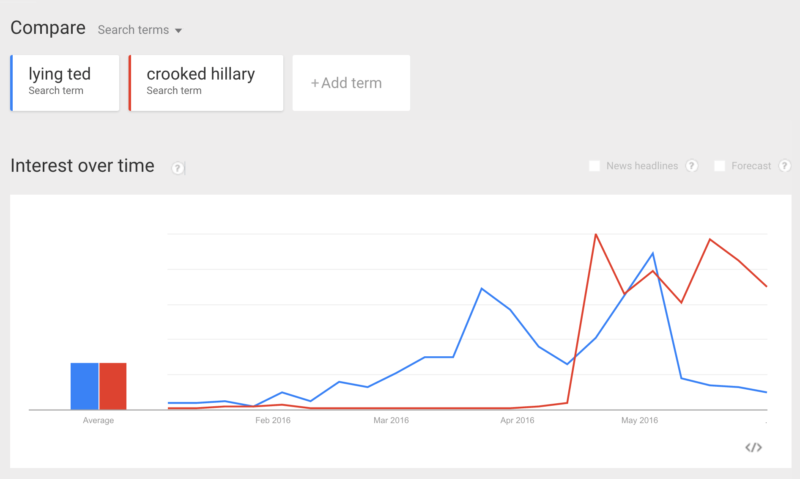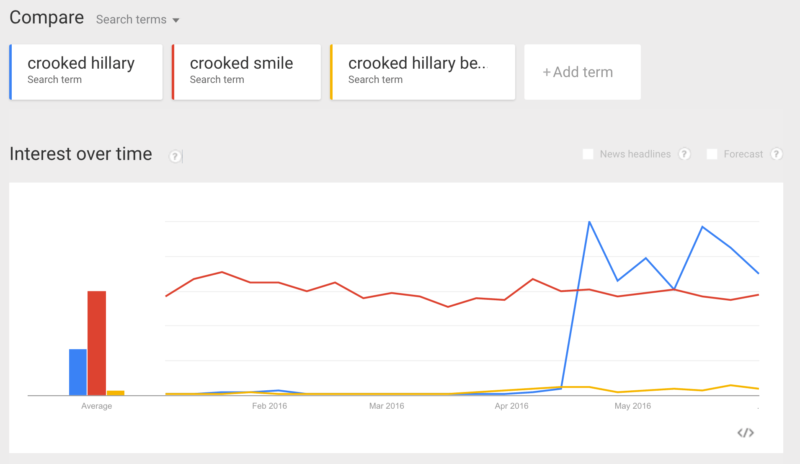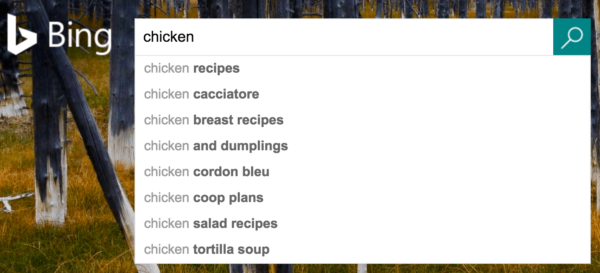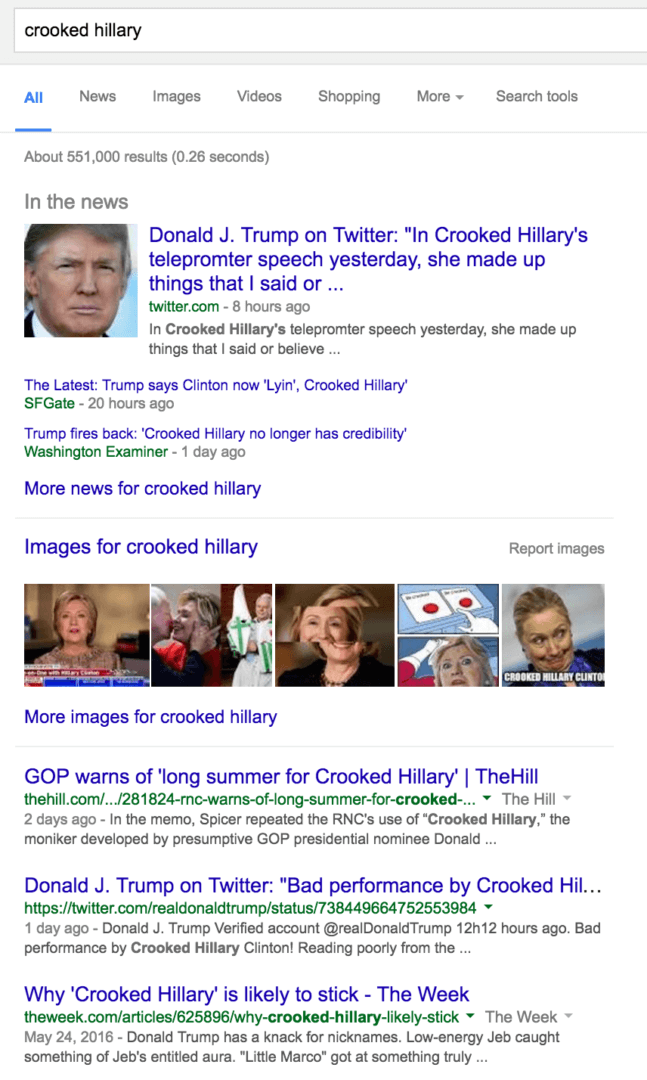Google says it’s not deliberately filtering “Crooked Hillary” suggested search to favor Clinton
Google offers an autocomplete suggestion of "Lying Ted" for "lying" but fails to do something similar for Clinton, raising questions.
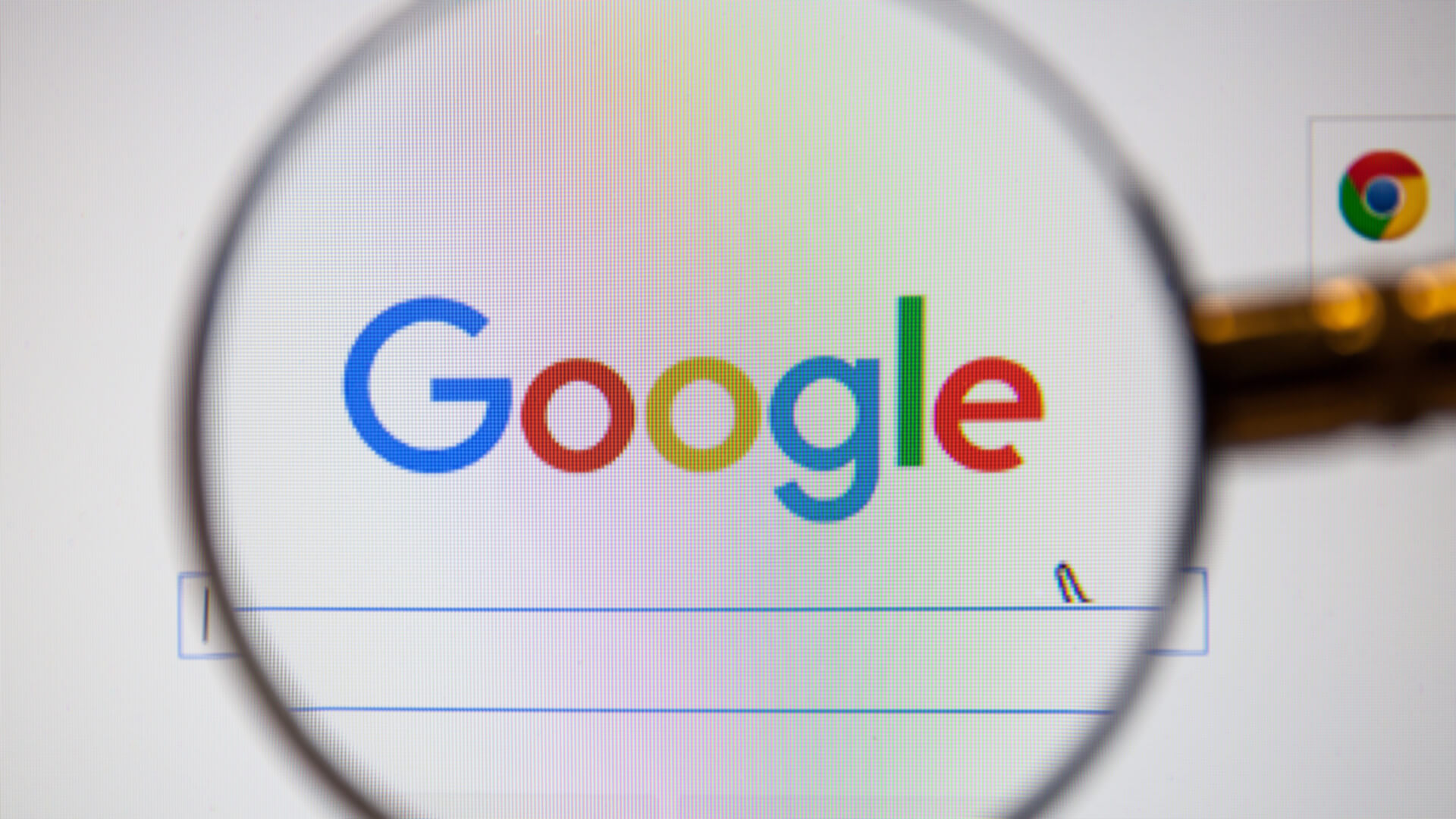
Type “lying” into Google, and it will suggest “Lying Ted,” the moniker US Republican presidential candidate Donald Trump placed on his onetime rival, Ted Cruz. But type “crooked” into Google, and it doesn’t bring up the “Crooked Hillary” label that Trump has attached to his Democratic rival Hillary Clinton. What’s going on?
It’s not because Google has done anything deliberate to favor Clinton, either through automated or manual means, the company told Search Engine Land. It sent this statement:
Autocomplete predictions are produced based on a number of factors including the popularity of search terms. Our systems are periodically updated to improve Search, and our users’ search activity varies, so the terms that appear in Autocomplete may change over time.
Additionally, our systems automatically filter a small set of offensive or inappropriate content from autocomplete predictions.
There is no difference between how our removal filters operate among candidates.
In short, if Google’s systems are filtering out the “Crooked Hillary” suggestion, it’s not because Google is trying to favor Hillary Clinton. Beyond that, the company isn’t going into more detail about why the change is happening.
The company notes that when searches are done for the full names of candidates, such as “Lying Ted Cruz” or “Crooked Hillary Clinton,” no suggestions at all appear — a sign of how both are being equally treated when their full and unambiguous names are involved.
Why is it happening?
So what is going on to cause this? That’s what I was trying to figure out when I first posted this story at 6:15 p.m. ET on June 3. At that time, Google had only provided an ambiguous statement without a denial that said:
Autocomplete predictions are produced based on a number of factors including the popularity of search terms. Our systems are periodically updated to improve Search, and our users’ search activity varies, so the terms that appear in Autocomplete may change over time.
With that effective non-answer, my original headline was “Google has no good explanation for why ‘Crooked Hillary’ isn’t a suggested search” and the original story dived into trying to figure out what was happening. That original exploration is below, my analysis of the weirdness in the situation.
Google autocomplete & the Trump insults
Vice’s Motherboard site has a good article on the situation, which was initially raised on a Reddit thread where many suspect a Google conspiracy.
As I told Motherboard, it was certainly weird to me. My initial thought was that perhaps because “Lying Ted” had been out there longer, it had more time to attract enough searches that, in turn, caused it to become a suggested search.
That’s how Google’s autocomplete suggestions work: it shows the most popular searches Google is seeing that are related to the words or characters you initially type in.
Here you can see it in action for a search on “lying,” which brings up “lying ted” as a suggestion:
But for a search on “crooked,” you don’t get a similar situation for “crooked hillary,” as you can see:
Even if you expand the search to “crooked h,” you don’t get “crooked hillary” as a suggestion but instead the strange “crooked hillary bernie” coming up:
“Crooked Hillary” as search popular as “Lying Ted”
As it turns out, “Lying Ted” and “Crooked Hillary” are pretty much even in terms of search popularity, according to Google Trends, for this year within the United States. And while “Lying Ted” became popular earlier, at this point, “Crooked Hillary” has been out there long enough that you’d think it would be a suggested term also:
Of course, if “Lying Ted” is more popular among all the various lying-related searches than “Crooked Hillary” is among the various crooked-related searches, that might explain the absence of “Crooked Hillary.” But once again, Google Trends debunks this possible explanation:
For over a month, “Crooked Hillary” has been more popular than “crooked smile” in the US, yet “crooked smile” appears as the top suggested search, while “crooked hillary” does not. Crooked Hillary is even more popular than “Crooked Hillary Bernie,” yet only the latter shows if you do a “crooked h…” search.
Why Google filters autocomplete
Again, it’s weird. There’s no good explanation for it. Personally, I doubt Google would actually proactively filter this particular search. But it’s neither confirmed nor denied that, so the guessing, speculation and assumptions will continue.
Google does use various methods that it doesn’t discuss much to filter out some suggestions. What suggestions and for what reasons, it doesn’t specify. I asked again about this, twice today, and got no answer.
When I last wrote about autocomplete in detail about five years ago, Google had told me the reasons below might cause a suggestion to be censored either through an automated or human review process:
- Hate or violence-related suggestions
- Personally identifiable information in suggestions
- Porn and adult content-related suggestions
- Legally mandated removals
- Piracy-related suggestions
Since then, Google still hasn’t posted any of these reasons to its site. Its help page on autocomplete simply says that some terms might get filtered for “policy reasons,” as I’ve bolded below, without any further detail:
If no predictions appear for a particular word or topic, it could be that:
- The search term isn’t popular.
- The search term is too new. You might need to wait a few days or weeks to see predictions.
- The search term was mistaken for a policy violation.
Then again… Chicken Trump
Shortly after I wrote this story, Tom Bruning noted on Twitter that “Chicken Trump” isn’t a suggestion when you type in “chicken” on Google — a label attached to Trump by many on Twitter, after Trump recently declined to debate the other Democratic candidate, Bernie Sanders.
This is true — and all the same weirdness about why “Crooked Hillary” doesn’t appear also applies to “Chicken Trump,” which works against the anti-Trump conspiracy argument.
Google Trends shows that “Chicken Trump” has been more popular than “Crooked Hillary” on average in the US for the past 90 days:
Despite this, typing in “chicken” doesn’t suggest “Chicken Trump,” as you can see:
Google Trends also shows that “Chicken Trump” has been about as popular as the top suggestion of “Chicken George” and certainly more than “chicken maison,” as shown below:
What’s going on? Chances are, “Chicken George” — a character in “Roots” — has shot to the top of the list based on a very recent spike in popularity as the “Roots” remake has been airing. That’s despite the fact that “chicken recipes” and “chicken pox,” which are two and three on the list, easily beat “Chicken George” in search popularity. Meanwhile, “chicken maison” is likely showing up for me because of my geographic location near a restaurant of the same name.
As you can see, Google’s suggestions aren’t simply down to everyone seeing the same list or the most popular thing always being first. It would be so much better if Google were transparent about how it works. But in lieu of that, those who want to believe that Chicken Trump has been filtered out as part of a pro-Trump conspiracy are free to do so.
Meanwhile, over at Bing
To further complicate matters, let’s bring in Google’s chief rival, Bing. It also shows suggested searches. There, “Crooked Hillary” is suggested, while “Chicken Trump” is not:
The Clinton suggestion at Bing can be taken as a further sign that Google is somehow working to prevent the same thing from happening. After all, both search engines offer search suggestions largely based on popularity. Then again, the lack of a Trump suggestion could indicate that Bing is somehow favoring Trump. Or… both are a reminder that Bing is an entirely different search engine, so you can’t expect it to behave exactly like Google.
The bigger issue: no favoritism for Clinton in search results
While it’s easy to get concerned with Google over this — and it does deserve some criticism, especially when it effectively responded in silence — the bigger issue is whether Google is perhaps slanting search results themselves to favor Clinton. That certainly does not seem to be the case.
Someone who starts to type in “crooked” in hopes of finding information about “Crooked Hillary” is almost certainly going to continue that search whether or not Google automatically fills in the rest. It’s such an unusual term that they’re most likely deliberately seeking that out. And the results they get back aren’t positive to Clinton:
As with the flap over Facebook Trending Topics, concerns over suggestions are real, but far more important is what people get in the stuff they actually see the most. Are Facebook News Feed content or Google search results being skewed for some political agenda?
This doesn’t appear to be happening with Google (nor did it seem the case with Facebook). Still, a weird situation with the suggestions isn’t going to help Google’s credibility.
NOTE: As explained within the story, this has been updated with a new top to reflect Google’s effective denial of intervention with suggested searches to favor Hillary Clinton or any candidate.
Contributing authors are invited to create content for Search Engine Land and are chosen for their expertise and contribution to the search community. Our contributors work under the oversight of the editorial staff and contributions are checked for quality and relevance to our readers. The opinions they express are their own.
Related stories
